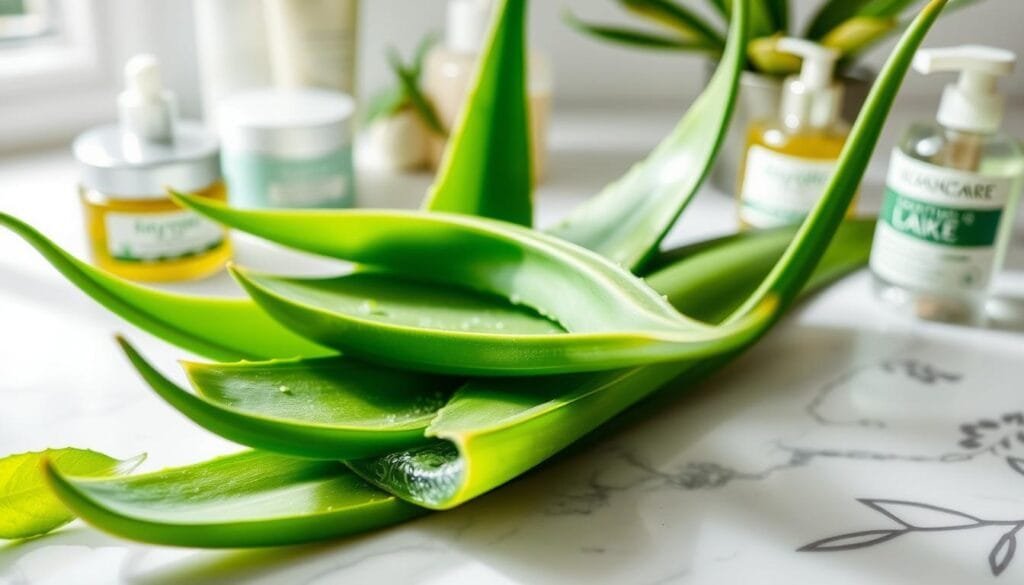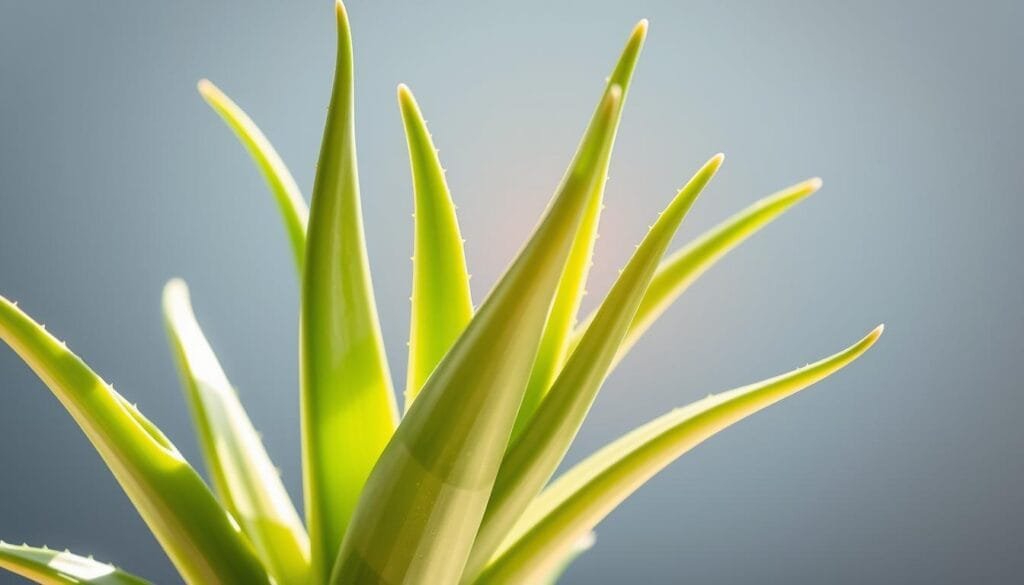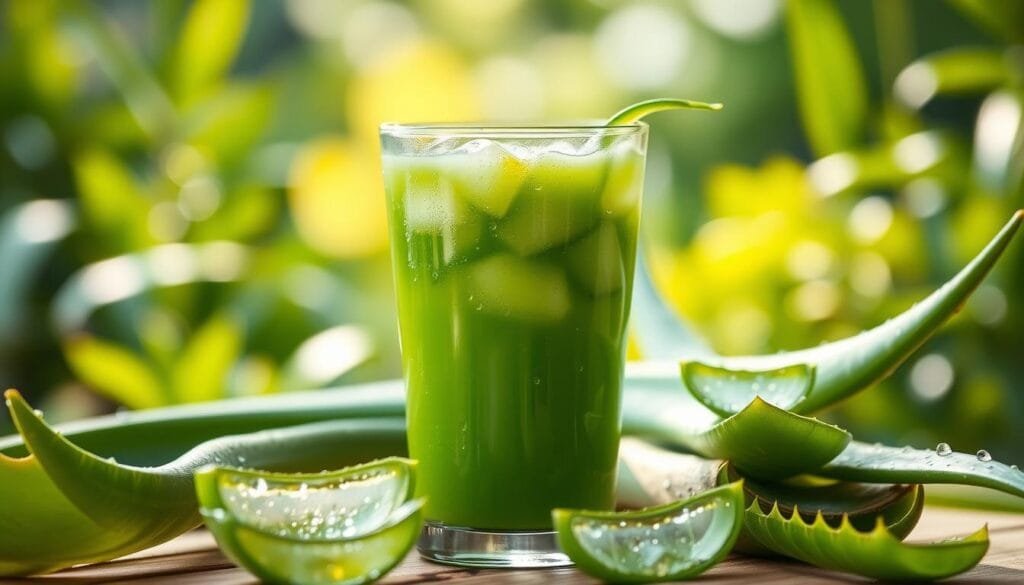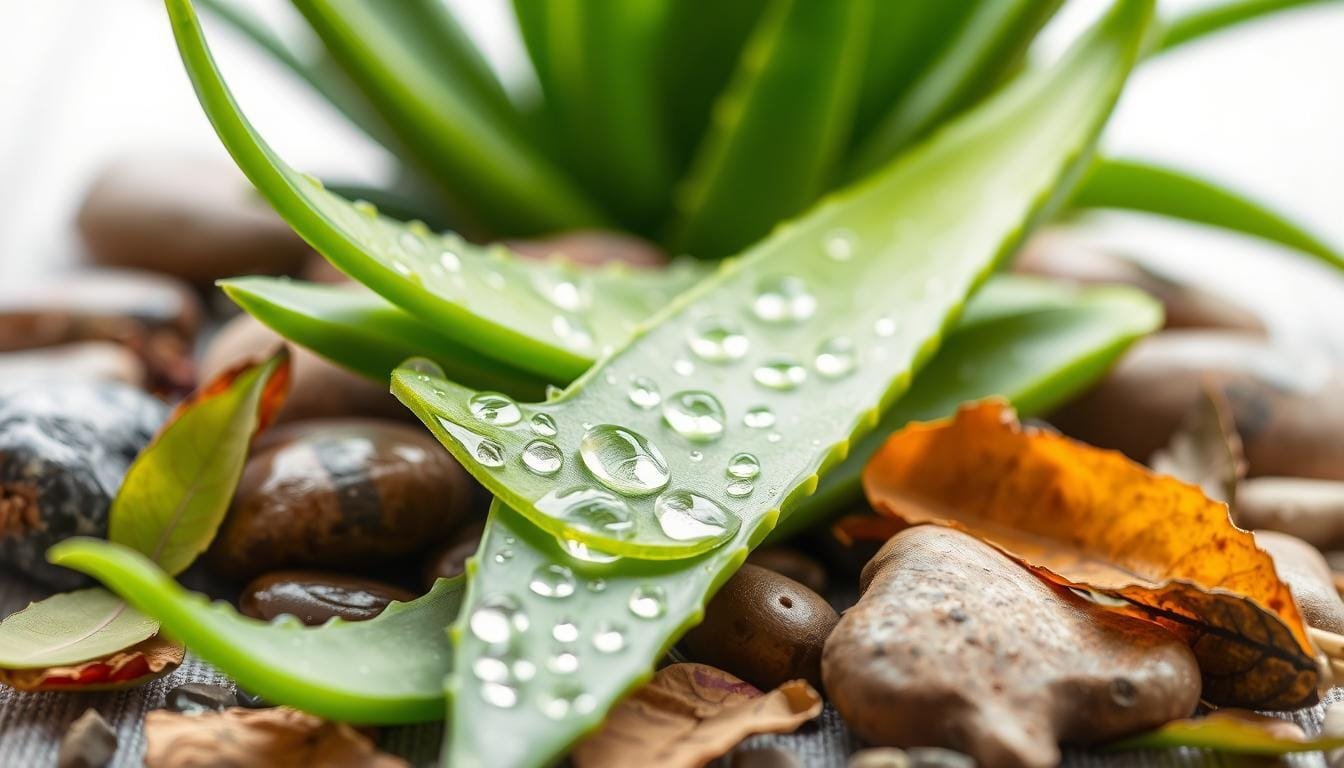Aloe vera is a medicinal plant known for its healing powers for centuries. It has over 75 active ingredients, including enzymes and vitamins. This plant is great for our skin and digestive health.
It’s a natural remedy that’s popular worldwide, with a market value of $13 billion. In this guide, we’ll explore aloe vera’s benefits. It can help with sunburns, blood sugar, and more. Let’s discover how aloe vera can improve our health and beauty.
Understanding Aloe Vera: A Historical Perspective
Aloe vera has been loved for its health and beauty benefits for over 4,000 years. It started in the Arabian peninsula and caught the eye of ancient civilizations. From Egypt to Greece, and India to China, it has been a favorite. Its long history shows the power of nature’s gifts.
Ancient Egyptian Uses and Royal Connections
The ancient Egyptians first saw aloe vera’s amazing benefits. They called it the “plant of immortality” and used it in royal baths. They even gave it to pharaohs as a burial gift.
Queen Cleopatra used aloe vera gel in her beauty routine. She loved its moisturizing and soothing effects.
Traditional Medicine Applications Through History
For centuries, aloe vera has been used for medicine. The ancient Greeks used it for wounds, hair loss, and digestive problems. In Asia, it’s been in drinks and juices for its health benefits.
The historical significance of aloe vera shows its lasting appeal as a natural remedy.
Modern Scientific Recognition
Recently, scientists have studied aloe vera and found new uses. From treating radiation dermatitis in the 1930s to confirming its skin benefits in the 1820s, it’s fascinated researchers and users.
| Year | Historical Event |
|---|---|
| 2100 BC | A record of aloe vera’s benefits appears on a Mesopotamian tablet |
| 1550 BC | A description of aloe vera’s medicinal purposes is documented |
| 70 AD | The Greeks use aloe vera to treat wounds, hair loss, and other issues |
| 1655 | First mention of aloe vera in the English language by John Goodyew |
| 1820 | The U.S. Pharmacopeia confirms aloe vera’s skin-protecting properties |
| 1930s | Aloe vera is used to treat radiation dermatitis |
“Aloe vera has been known and used for centuries with its therapeutic advantages and healing properties.”
The Chemical Composition of Aloe Vera Plant
Aloe vera is a plant full of good stuff. Its inner gel is packed with nutrients like polysaccharides and antioxidants. These help it improve health and beauty.
The plant is mostly water, with the gel being the most watery part. But the solid parts of the leaf are where the magic happens. They contain vitamins, minerals, and other important compounds.
Aloe vera has over 75 active ingredients. Most of its benefits come from its polysaccharides. These, along with antioxidants and other bioactive ingredients, make it great for healing and boosting the immune system.
| Aloe Vera Compound | Function and Benefits |
|---|---|
| Polysaccharides | Promote wound healing, have anti-inflammatory effects, and provide gastrointestinal protection. |
| Antioxidants | Help inhibit bacterial growth, protect against oxidative stress, and support overall health. |
| Vitamins and Minerals | Include vitamins A, C, E, and B12, as well as minerals like zinc, copper, selenium, and calcium. |
| Enzymes | Such as amylase, catalase, and peroxidase, which contribute to the plant’s therapeutic effects. |
| Fatty Acids | Include beneficial compounds like lupeol and campesterol, which offer anti-inflammatory properties. |
The makeup of aloe vera can change based on how it’s grown and processed. But its mix of bioactive ingredients, including polysaccharides and antioxidants, is impressive. It’s a plant with many uses for health and beauty.
Benefits of Aloe Vera for Skin Health
Aloe vera is known for its amazing skin benefits. Its gel is full of good stuff that helps your skin. It keeps your skin moist, fights aging, and soothes sunburns.
Moisturizing and Hydrating Properties
Aloe vera is great for hydrating and moisturizing your skin. It’s mostly water, which helps keep your skin moist. It’s perfect for dry skin or anyone looking for a natural moisturizer.
Anti-aging Effects and Collagen Production
Aloe vera does more than just hydrate. It also fights aging signs. It helps make collagen, which keeps your skin elastic and firm. This reduces wrinkles and keeps your skin looking young.
Treatment for Sunburns and Minor Burns
Aloe vera is famous for treating sunburns and minor burns. Its cooling and anti-inflammatory gel relieves sun-damaged skin. It also helps your skin heal faster.
Adding aloe vera to your skincare routine can change your skin game. It’s natural and works wonders for hydration, aging, and burns. This plant is a true skin hero.

Aloe Vera’s Role in Hair Care and Scalp Health
Looking for a natural way to make your hair healthier and more vibrant? Aloe vera might be the answer. This plant is known for its skin benefits and also helps with hair care and scalp health.
Aloe vera can fight seborrheic dermatitis, a common scalp problem. It can cause a rash, yellow scales, and even hair loss. Studies show aloe vera gel can reduce itchiness, scales, and the affected area size. This suggests it can help your hair grow healthier.
Aloe vera is packed with vitamins A, B12, C, and E. These vitamins are key for hair follicle health and growth. Its moisturizing properties also keep the scalp hydrated, preventing dryness and flakiness that can slow hair growth.
While more research is needed, aloe vera’s anti-inflammatory and soothing effects are promising. It can help with scalp issues, which might lead to thicker, healthier hair.
When using aloe vera for hair, choose pure, high-quality gel. Avoid products with added fragrances or preservatives. Always do a patch test to avoid allergic reactions. With the right use, aloe vera could make your hair shine and grow stronger.
| Benefits of Aloe Vera for Hair | Supporting Evidence |
|---|---|
| Combats seborrheic dermatitis | Studies show aloe vera significantly reduces itchiness, scaliness, and affected area size in those with the condition. |
| Promotes healthy hair growth | Aloe vera is rich in vitamins A, B12, C, and E, essential for maintaining healthy hair follicles. |
| Moisturizes and hydrates the scalp | The plant’s moisturizing properties can help prevent dryness and flakiness that can inhibit hair growth. |
| Reduces inflammation and irritation | Aloe vera’s soothing and anti-inflammatory properties make it a promising natural solution for scalp issues. |
More research is needed to fully understand aloe vera’s effects on hair growth. But, the evidence so far suggests it could be a great addition to your hair care routine. Using aloe vera might help you achieve the healthy, vibrant hair you’ve always wanted.
Natural Healing Properties for Wounds and Burns
Aloe vera is a plant known for its amazing healing powers. It helps with various wounds and burns. Its wound healing and anti-inflammatory properties make it great for treating burns and other skin issues.
How Aloe Vera Accelerates Wound Healing
Research shows aloe vera gel can cut burn healing time by about 9 days. It reduces redness, itching, and infections in burns. This is because of its anti-inflammatory and antibacterial properties.
Anti-inflammatory Effects on Injuries
While aloe vera’s benefits for other wounds are not clear, research is promising. A study of seven trials with 347 people found aloe vera not better than silver sulfadiazine for burns. Yet, it helped some wounds heal faster.
Despite mixed results, the study noted the quality of trials was low. This means we should be cautious about its benefits. More research is needed to fully grasp aloe vera’s healing powers.

“Nearly 80% of the world’s population relies on traditional herbal medicine for primary health care.”
Oral Health Benefits and Dental Care Applications
Aloe vera is a plant with ancient healing powers. It has become a key player in oral health and dental care. Research shows that aloe vera mouthwash is as good as chlorhexidine in fighting plaque and gingivitis.
Aloe vera also fights Candida albicans, a common mouth yeast. It helps heal mouth ulcers and canker sores faster. A 2022 review found aloe vera works better than other treatments for mouth ulcers.
Aloe vera’s benefits don’t end there. It has anti-inflammatory properties that help with conditions like gingivitis and gum infections. Its extracts block the arachidonic acid pathway, reducing inflammation.
Aloe vera is also packed with vitamins, minerals, and amino acids. These nutrients support dental health. Its antioxidants fight free radicals, and its antimicrobial properties stop bacteria that cause cavities.
Aloe vera tooth gel is a gentler option for those with sensitive teeth or gums. It’s free from abrasives and soothes the mouth. This makes it a favorite for natural oral care.
Looking to keep your smile healthy or tackle dental issues? Aloe vera offers many solutions. Adding aloe vera products to your daily routine can boost your oral health naturally.
Digestive Health and Internal Benefits
Aloe vera is known for its skin-soothing properties. It also benefits our digestive health and overall well-being. Studies show it supports healthy gut function and improves nutrient absorption.
Impact on Gut Health
The polysaccharides in aloe vera juice act as a prebiotic. They help grow good gut bacteria. This keeps our gut microbiome balanced, which is key for digestion and immune function.
Aloe vera also soothes an upset stomach and relieves indigestion. It’s a natural remedy for stomach discomfort.
Supporting Nutrient Absorption
Aloe vera juice boosts the absorption of vitamins and minerals like vitamin C and E. Its compounds act as a time-release agent. This keeps nutrient levels high for longer.
This better nutrient absorption supports overall health and well-being. It helps with immune function and skin health.
Adding aloe vera juice to your daily routine supports digestive health and nutrient absorption. It’s a natural way to soothe your stomach or boost your body’s nutrient intake.

“Aloe vera has been used for centuries to support digestive health and overall well-being. Its unique compounds can help maintain a healthy gut, while also improving the absorption of essential vitamins and minerals.”
Aloe Vera’s Impact on Blood Sugar Management
Aloe vera, a popular succulent plant, has caught the eye of researchers. They are looking into its benefits for managing blood sugar levels. Studies suggest it may improve insulin sensitivity and help control blood sugar, which is good for people with diabetes or prediabetes.
A 2021 review of studies found aloe vera supplements can help manage blood sugar. They found that aloe vera supplements can lower fasting blood sugar by 46.6 mg/dL. Also, A1C blood levels can drop by 1.05 percent. A meta-analysis showed aloe vera supplements can reduce A1C by 0.4 percent and fasting glucose by 30 mg/dL in people with prediabetes or early type 2 diabetes.
The exact ways aloe vera affects blood sugar are being studied. But, research points to better insulin sensitivity and less glucose absorption in the gut. A 2015 study found aloe vera gel can improve fasting blood glucose in diabetics.
But, the results on aloe vera’s effect on HbA1c levels in diabetics are mixed. Also, many with type 2 diabetes struggle to reach their blood glucose goals. This could be due to high medication costs and side effects.
Despite the promise of aloe vera for blood sugar management, more research is needed. The National Center for Complementary and Integrative Health warns about the risk of hypoglycemia with aloe vera and diabetes medications. Always talk to a healthcare professional before adding aloe vera to your diabetes plan.
| Potential Benefits of Aloe Vera for Blood Sugar Control | Potential Risks and Limitations |
|---|---|
|
|
In conclusion, aloe vera may help with blood sugar management, but more research is needed. It’s important to talk to a healthcare professional before adding aloe vera to your diabetes plan.

Anti-inflammatory and Immune System Support
Aloe vera is more than just a skin soother. It also has amazing anti-inflammatory and immune-boosting powers. Its antioxidants help strengthen our body’s defenses, protecting us from oxidative stress.
Boosting Natural Defense Mechanisms
Research shows that aloe vera extract boosts our body’s antioxidant levels. Its polysaccharides and other compounds may also enhance our immune response. This could help reduce long-term inflammation in our bodies.
Reducing Chronic Inflammation
Aloe vera is known for its anti-inflammatory effects. Studies reveal that its gel contains compounds that fight inflammation. This makes it a great tool for managing chronic inflammation, like arthritis and some cancers.
| Compound | Potential Benefit |
|---|---|
| Antioxidants | Protect against oxidative stress and support the immune system |
| Polysaccharides | Modulate immune response and reduce chronic inflammation |
| Anti-inflammatory compounds | Help manage conditions characterized by chronic inflammation |
Using aloe vera’s anti-inflammatory properties and antioxidants can boost your immune system support. This proactive step can improve your overall health and well-being.
“Aloe vera’s antioxidant and anti-inflammatory properties make it a versatile natural remedy with far-reaching benefits for the body.”
Safe Usage Guidelines and Possible Side Effects
Aloe vera is usually safe when used on the skin, but it’s different when taken by mouth. Taking too much aloe latex can harm your kidneys and cause serious problems. It might also lead to stomach cramps, diarrhea, and an imbalance of electrolytes.
It could also affect how some medicines work, like blood thinners and diabetes drugs. Pregnant women and kids under 12 should not take aloe vera supplements.
Before adding aloe vera to your routine, talk to a doctor, even if you’re healthy. Start with a little and see how your body reacts. If you’re using it on your skin, do a patch test first to make sure you don’t have any allergic reactions.
| Potential Side Effects of Aloe Vera | Precautions and Contraindications |
|---|---|
|
|
By following these aloe vera safety guidelines and being aware of possible side effects, you can enjoy its many health and beauty benefits. Always put your health first and get advice from a professional before using aloe vera.
Different Forms and Applications of Aloe Vera Products
Aloe vera is a versatile plant with many health and beauty benefits. It comes in various forms, each with its own use. You can find it as gels, ointments, juices, supplements, and even powders.
Topical aloe vera gel is well-known for its hydrating and soothing effects. It can treat sunburns, minor burns, and skin conditions like acne and eczema. Apply it directly to your skin for quick relief and long-term benefits.
Aloe vera juice and other forms like capsules and tinctures offer internal benefits. They support digestion, nutrient absorption, and immune function. Some studies suggest they can help with irritable bowel syndrome (IBS) symptoms.
Aloe vera supplements and powders give you a concentrated dose of the plant’s compounds. They are great for overall health, including anti-inflammatory and antioxidant effects.
Aloe vera’s versatility is amazing. It can soothe sunburned skin or boost your body’s defenses. This ancient plant offers many possibilities for your health and beauty routine.
“Aloe vera is a true wonder plant, with many uses for both internal and external health. From gels to juices and supplements, there are endless ways to use it in your daily routine.”
The amount of aloe vera in products varies a lot. It can be as little as 0.5% in some creams or 100% in treatments for psoriasis. Always check the labels to find what suits you best.
Looking to soothe your skin, support your digestion, or add aloe vera to your wellness routine? There’s a product for everyone. Explore the different forms and see how aloe vera can transform your life.
Incorporating Aloe Vera into Your Daily Wellness Routine
Adding aloe vera to my daily routine has changed my health for the better. It’s a natural wonder that boosts many areas of my life. From skincare to digestive health, aloe vera is a game-changer.
I use aloe vera gel or products in my skincare. It makes my skin feel good and look better. It reduces aging signs and soothes sun damage. My skin looks healthier and more radiant.
I also drink aloe vera juice for my health. It’s full of vitamins, minerals, and enzymes that help my digestion. I feel more energetic and my digestion is better. Plus, it keeps my mouth healthy by fighting bacteria.







